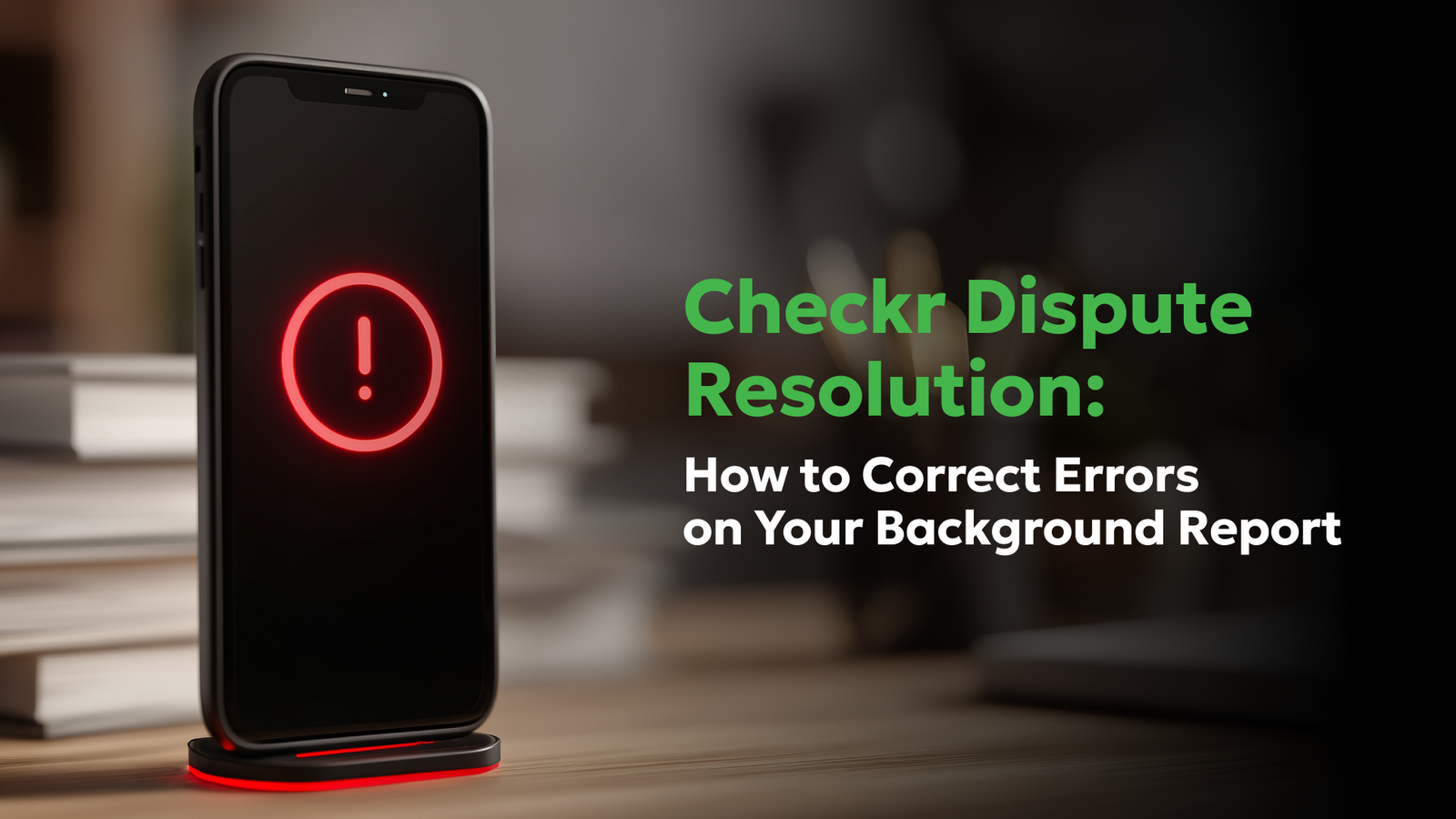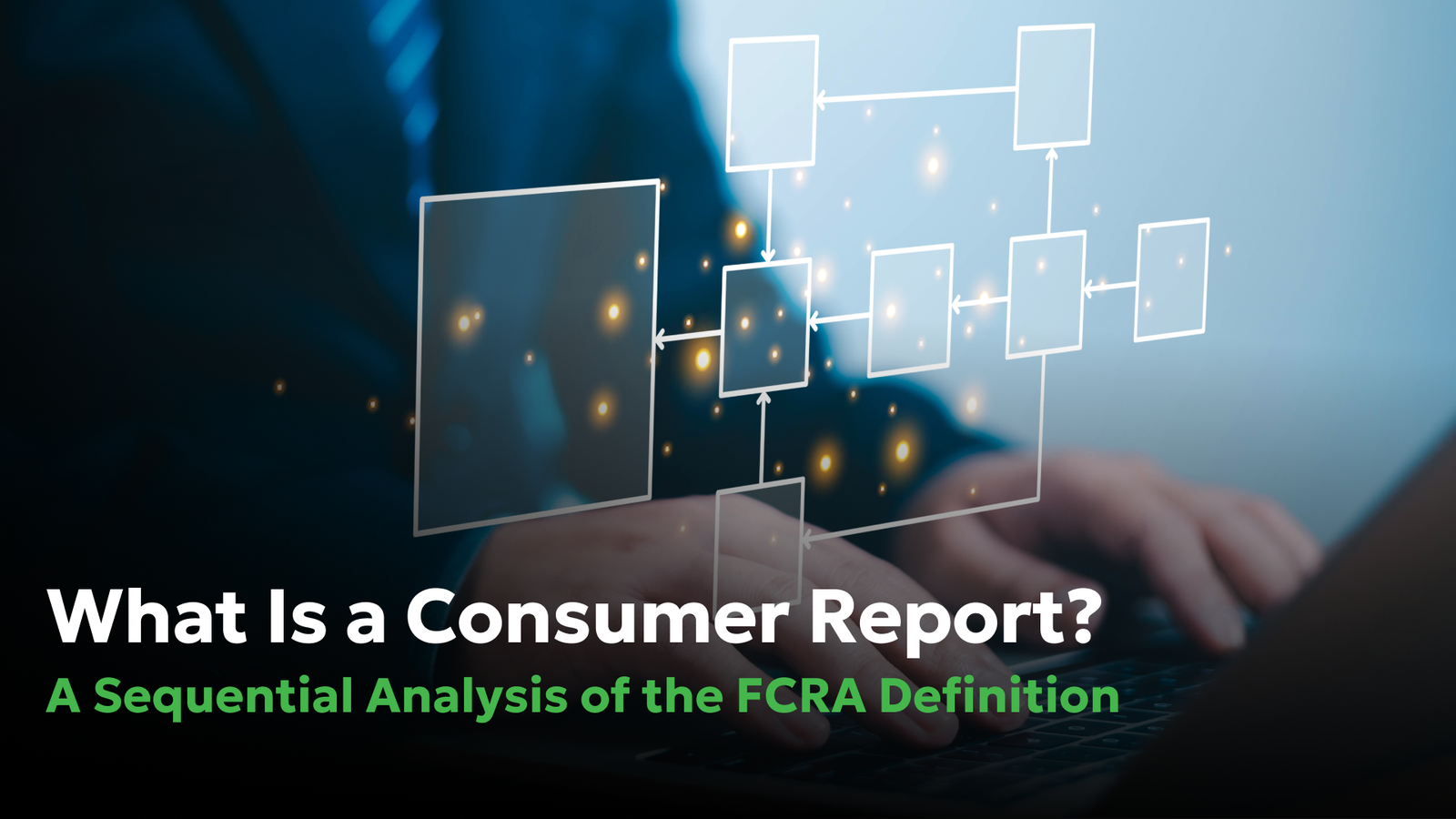Why Did Your Credit Score Drop for No Reason
- Blog
- All about FCRA
Why Did Your Credit Score Drop for No Reason

Many things besides paying your bills on time affect your credit score. Here’s how to control the ones you can control.
The three major consumer reporting agencies use all sorts of analytics in devising your credit score. Some of them will surprise you, and some of them are why your credit score might drop for what looks like no apparent reason. We explain some of the factors and some of the ways you can retake control of your credit score.
We encourage consumers to regularly review their credit reports. You need to periodically review your credit reports to make sure there are no errors or inaccuracies. To be thorough, you should request and review your credit reports from the three major credit reporting bureaus - Equifax, Experian, and Transunion - as each credit report is just a little bit different, and each is susceptible to errors and inaccuracies. This is necessary for maintaining your financial well-being. A credit report error can have a devastating effect on your credit status.
A federal law called the Fair Credit Reporting Act (FCRA) requires consumer reporting agencies to provide a free credit report to whoever requests it every year. This rule has since evolved and now consumers can request and receive a free credit report every week. You can do this by visiting the consumer credit reporting agency's website or visiting a website called annualcreditreport.com.
As consumer lawyers, we often hear our clients express confusion about why and how their credit scores dropped for no reason. Indeed, the credit score can be confusing. You didn't take out any new loans. You didn't take out any new credit cards. You've paid your bills on time. You didn't buy a new car, rent a new apartment, or make any other big purchases. So why would your credit score randomly drop?
9 Reasons Your Credit Score Could Go Down
There are several reasons why this could happen - reasons that are not always obvious and reasons of which you may not be aware but are happening nonetheless as your financial history and credit profile evolve. While credit score fluctuation is normal, and you can expect some slight drops and increases in your credit score, you should still be aware of the reasons that your credit score could drop without you being aware of it. This article identifies some of the more common yet often overlooked reasons for a credit score drop and what you can do about them.
1. Small Balances
You have done everything perfectly - paid everything on time and gotten all your cards down to a zero balance. So why did your credit score drop for no reason? Sometimes - and this might strike you as highly counterintuitive - but having zero balance on one or several credit cards can damage your credit score. But you thought having debt was bad? It turns out that a credit score drop can still happen when you have zero debt. Why? In order to assess your creditworthiness, lenders and potential lenders need to see how you manage your credit, whether you pay your bills on time, and how you prioritize your payments. Without any history or any records of doing that, your creditworthiness decreases.
2. Outstanding Collections
These are debts that you were likely aware of at one time but have forgotten. These are debts that creditors have sent to collection agencies. When a creditor wants to get rid of old debt, the creditor will sometimes sell old debt to collections agencies. Collection agencies can report to the credit bureaus that you have an account in collections. When a credit bureau learns that you have been sent to collections, your credit score drops dramatically. This often happens when people move with frequency, and an old utility bill or an old store credit card bill is sent to an old address and is soon forgotten. A credit report lawyer can help you determine if your account was sent to collections without adequate notice.
3. Credit Utilization Ratio Changes
Your credit utilization ratio is the ratio of the debt that you have to the debt that you could possibly have. In other words, if your credit card limit is $10,000 and you have spent $4,000 of that, your credit utilization ratio is 40%. Sometimes, without realizing it, consumers spend more than they realize in the ordinary course of their lives. An increased credit utilization ratio will result in a credit score drop. Lenders like to see a credit utilization ratio of less than 30%.
4. Closing Old Accounts
History can contribute to a good credit score. The longer you have been a debtor and the longer you have maintained good credit, the better your credit score. Sometimes, closing old accounts unwittingly has the effect of shortening your credit history. In devising your credit score, the credit reporting agencies will use equations where the average age of your credit helps to determine your credit score.
5. Hard Inquiries
A hard inquiry represents a lender or potential lender requesting or looking into your credit report. Credit bureaus often have an entire section of your credit report devoted to inquiries. When a potential lender sees multiple and recent inquiries, they frequently see that as a sign of financial distress and an indicator that you may be taking on more debt in the future. They do not like to see this. Multiple hard inquiries will result in a sudden drop in your credit score. This often happens when a consumer seeks to get approved for an auto loan online or some other inquiry.
6. Changes in Credit Types
Creditors like to see a variety of credit on your credit report. this means that credit cards, student loans, a mortgage, and auto loans together create a better credit status and credit score than if you had the same amount of debt with just one huge credit card. Again, while paying off debt is a good idea, paying off one type of loan will lower your credit mix, which in turn could lower your credit score.
7. Co-signed Loans
When you co-sign a loan, you are legally responsible for the loan. Sometimes, without you even being aware, the primary borrower of a loan that you cosigned will miss a payment. This reflects poorly on you and will lower your credit score. Unless the primary borrower alerts you to the fact that they will not be paying their bill on time, this will drop your credit score for what looks like no reason.
8. Credit Report Errors
Sometimes, your credit report is wrong. Errors and inaccuracies can happen on a credit report for multiple reasons. A typo or a misspelling of your name or a wrong digit on your social security number can result in other people's debt appearing in your credit report. Furthermore, when the credit reporting agencies call and compile your data from creditors and financial institutions with which you do business, those financial institutions might make an error or send the credit reporting agency outdated information. Also, sometimes, the credit reporting agency can just make a mistake. They may misidentify an account that has been closed as an open account. Any mistake or inaccuracy can erode your credit score without you being aware of it.
9. Lender Portfolio Adjustments
Sometimes, credit card companies and lenders will do things of which you are unaware. They might change the terms of your credit card, lower your credit limit which would increase your credit utilization ratio, or they may cancel your account without you being aware of it. Any of these things can, for all the reasons we've already discussed, lower your credit score. These are things that lenders can do without you being aware of them because they are things that lenders do in response to economic factors. Because of a problem in the economy or a change in their policies, it could result in a change to your credit score.
Some Ways to Improve Your Credit Scores
As you can see, there actually are reasons why your credit score dropped for what looked like no reason. The best way to improve your credit score is to be aware of the reasons that a credit score can drop for what looks like no reason and then do your best to avoid those situations.
Another thing you can do is regularly monitor your credit reports from all three credit reporting bureaus: Equifax, Experian, and TransUnion. review them thoroughly and look for any errors. When you do find any errors or inaccuracies, the FCRA outlines a dispute process and dispute protocols where you can dispute the error or an accuracy with the respective Credit Union. Contact consumer attorneys for answers to your specific questions.
In What Cases Do You Need the Help of a Lawyer
Your credit score is very important. And as this article illustrates, it depends on many more factors than just paying your bills on time. When your credit score takes an unexpected turn downward, and after your investigation, you still have questions, contact Consumer Attorneys. Consumer protection is what we do. We know consumer protection laws. We know how the credit reporting agencies manufacture your credit score. And we know when it's appropriate to take action against a credit reporting agency to get you the compensation you deserve for any damage they have caused.
Contact us by:
- Emailing us at info@consumerattorneys.com to request a meeting with an attorney.
- Calling us at 1-877-615-1725.
We can help you identify the reason for the drop in your credit score. And if there’s any legal action to take, we will be able to advise you on the best plan of action and help you take the right steps to recover.
Frequently Asked Questions
There are many factors which contribute to a person's credit score. While paying bills on time is certainly a significant contributor, other things like the variety of credit, your credit utilization ratio, the age of your credit, and the number of hard inquiries are also significant factors that determine your credit score. These are things over which you have some control, and once you learn them, you can adjust your routines to help improve your credit score. Other factors, like the behaviors of the primary holder of a loan that you co-signed and errors on your credit reports, are things that you can't control. To maintain a good credit score, we recommend regular review of your credit report from all three of the major credit reporting bureaus: Equifax, Experian, and TransUnion.
A credit score drop of 100 points is significant, and if that is something you have experienced, then something serious is going on. There are many things people are unaware of that can result in their credit score dropping. A credit score drop of 100 points likely means that one of your credit accounts was sent or sold to a collection agency and that the collection agency has reported you to the credit reporting bureaus. We see this happen with some frequency when people move and an old utility bill is sent to collections or some other mix-up from a long-forgotten credit card. A significant error or inaccuracy on your credit report can also create a sizable drop like this. You should treat a 100-point drop in your credit score seriously and do what you can to improve it. Contact consumer attorneys for help.
If you think your credit report drop is the result of an error or inaccuracy on your credit report, you can file a dispute. A consumer protection attorney can help you strategize, shepherd your dispute, and support you throughout the process. However if the sudden or random drop in your credit score results from something legitimate but of which you are unaware, you should review your credit report thoroughly and see if any common pitfalls which can lead to credit score drops are happening. If so, there are ways to correct and recover from those.
The answer to this question depends on what made the credit score drop. In the event of an error or inaccuracy on the part of the credit reporting bureau, you can file a dispute, and federal law demands that the credit reporting bureau investigate and fix it and get back to you within 30 to 45 days. Credit score drops that result from a hard inquiry can stay on your credit report for up to two years, but the drop in your score from the hard inquiry may only last about three months. A bankruptcy can severely affect your credit score for six or more years. The credit score recovery time for a late mortgage payment Is approximately nine months.


Daniel Cohen is the Founder of Consumer Attorneys. Daniel manages the firm’s branding, marketing, client intake and business development efforts. Since 2017, he is a member of the National Association of Consumer Advocates and the National Consumer Law Center. Mr. Cohen is a nationally-recognized practitioner of consumer protection law. He has a we... Read more
Related Articles




R
ONGS™You pay nothing. The law makes them pay.







